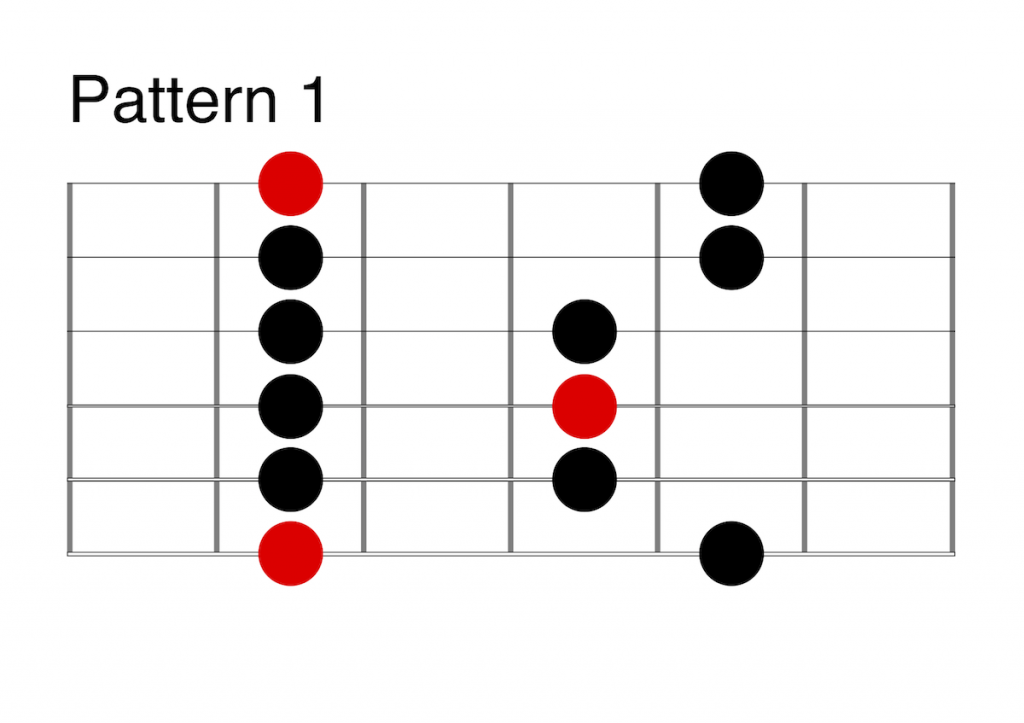As a guitar performance coach, I regularly meet or receive coaching enquiries from guitar players that share a common problem. They’re usually self-taught and have a rudimentary understanding of basic chords. More often than not, they might know one or two shapes of the major and minor pentatonic scales.
These players all have the same common challenge.
The challenge is that they can run their fingers up and down the first pentatonic minor scale shape, but have continually failed to unlock the ability to solo in a melodic fashion and follow the chord changes.

The common experience of these guitar players is that they have shied away from learning basic music theory. When they first picked up the guitar and preferred to simply commit basic chord shapes to memory, they ignored the foundational music theory concepts that every guitar player needs to understand if they want to simply make sense of their instrument.
If you’re struggling to connect the dots regarding how to solo in a meaningful and expressive manner, or to simply sound good over the chord progression, then chances are you’ve just memorised a scale pattern and you’re not seeing the deeper, inner workings of the intervals that make up the scale on the fretboard.
What you’re missing out on is that each interval in a scale can be thought of as representing a sonic “colour”. What I mean by “sonic colour” is your expression palette. Just like an artist that’s trying to paint an ocean landscape, having all of the colours at your fingertips is going to make that painting so much more vibrant and give you the ability to add those details that only subtle changes in colour can produce.
Learning without music theory
It seems to me that in social media and online, there is a whole glut of advertisements out there that say you can learn to solo on the guitar without having to learn any music theory.
While this idea is certainly appealing, it sounds too good to be true. The reality is that if your fingers are willing, you can teach them any series of notes. However, if you can’t play the pattern over and over again with 100% certainty on where those notes are located on the fretboard, you’re going to add any mistakes to your muscle memories and this is one of the key factors that prevents the brain from locking a skill you’ve developed in your short term memory into your long term memory. A skill in your short term memory must be memorised over and over again. A skill in your long term memory is one that your brain remembers for you and is now almost second nature.
Having a good grasp of basic music theory allows you to execute the same sequence of notes over and over again when you’re learning a new lick with 100% certainty of note choice. For example, if I’m playing a minor blues lick and I’m playing a root, a minor third, a fourth, a fifth, a flat seventh and the octave, I stand a much better chance of playing those notes accurately because I know which notes should be in the scale and I can identify these notes easily. This improves the precision of my practicing and ability to commit that guitar lick to memory.
One of the initial benefits for learning basic music theory is that it provides a framework of understanding where you can now take that same series of notes and you will be able to (with practice) overlay it over the parent scale. You’ll actually have something that you can pin that information to on the fretboard and say, “that series of notes came from this scale!”
Then your visual and cognitive ability to recall those shapes that you play will be that much easier.
Learning music theory won’t make you play like Eddie Van Halen, Slash, Steve Vai or any of your other favourite music heroes, but it will certainly get you a lot closer to understanding their note choices and why those phrases sound so good to us melodically and within the song.
A little about my own journey
I first picked up a guitar when I was eight years old. I brought a Suzuki acoustic guitar home from primary school. To say that my parents were less than thrilled would have been the biggest understatement of the year.
My dad said to me, “What the hell is that?!” I said, “It’s a guitar, dad.”
“Where’d you get that from?” I told him, “I’ve just borrowed it from school for the weekend”. “That’s going back on Monday then”, he said.
My mother was even less supportive, if you can imagine that. At eight years old, I was already clearly out of my depth. I struggled to even play the most basic chords and it all felt over my head and that’s the first time I gave into my fear of learning guitar.
The next time I picked up the guitar I was 15 years old and just like most people that are learning guitar, I sought out a friend that knew a few chords so that I could learn the basics. My parents surprisingly came to the party at Christmas and bought me a basic lead guitar course and a chord book. Straight away my earliest traumatic memories of struggling to learn and recall guitar chords and even the most rudimentary basic music theory came back to haunt me and left me in a cold sweat.
You can see straight away that I had a very unhealthy association to learning music theory. As a result, I was the guy I talked about at the beginning of this post. The guy that learned a few basic chords and shied away from learning the basics.
Why? Because music theory does have a lot in common with mathematics, and I was never good at math. Numbers intimidated me and I found myself easily confused with the prospect of having to think in a mathematical manner when it came to understanding chord and scale construction.
It is no secret that music theory is essentially “musical math”. There are many people like myself that are poor mathematicians and struggle to understand music theory when it’s represented in this manner. The bad news is that many guitar coaches are closet mathematicians. They find this stuff really easy to learn and understand, and are deeply puzzled when other people fail to be able to grasp the basic principles of music theory.
This was certainly my case. I had a number of guitar teachers over the years and try as I might, I simply could not understand music theory and apply it in a meaningful way to guitar.
20 years on, as you can imagine, I’m that self-taught guitarist that knew basic rudimentary chords but had no idea how to solo or improvise over a chord progression because my fear of learning got in the way of my fear of playing. Yes, there are some guitar greats that profess to know very little about music theory (like BB King and all the blues greats), but when you probe a little deeper, you come to realise very quickly that they actually do have a really good grasp of the basics. All of those guitarists, including Slash from Guns n Roses can readily identify all of the intervals that make up a scale. Intervals and notes like roots, minor thirds, major thirds, fifths, flat sevenths, major sevenths and octaves.
Like it or not, this information is like learning the alphabet and is essential if you want to string words (or in our case, notes) together in a legible fashion.
What changed for me, and what could change for you
I became frustrated with the traditional style of music theory teaching and I started out on a deep and meaningful quest to learn more about our brain’s preferred way of learning. You see, how you learn is equally important to what you learn, and the order you learn it in. In fact, when you use your brain’s preferred way of learning, you’ll encounter far less resistance and immediately improve your ability to retain and recall new information. You speed up the process of knowledge going into long term memory.
You save yourself days, weeks, months, even years of learning frustration and suddenly learning becomes fun.
In summary, when you’re learning how to solo, it’s essential to learn the basic music theory that provides the framework and the roadmap on the fretboard to help you make better sense of why each phrase works. It will also help you to understand the note selection of why your favourite artist chose those particular notes for their song. That same framework will improve your memory retention and your ability to recall that knowledge and get it under your fingertips, onto the fretboard.


Hi there! I’m curious if you have a PDF with a curriculum for learning guitar without music theory. Do you have a curriculum or any insight you can provide on what topics you discuss in your program? Please let me know!
Hi Paige,
Everyone learns slightly differently. As a world class performance coach, I (Paule) create custom curriculums based on my clients’ preferred learning style. Each custom curriculum is also there to address specific guitar challenges, coordination challenges and even learning challenges.
There is a wealth of knowledge around how to learn guitar that can be found on the internet, but often you need a coach to avoid developing bad habits and this is hard to translate into a PDF as it requires real time feedback. There’s nothing wrong with following a generic curriculum, however the learning deficit begins with how clearly we can translate what we see into the brain’s preferred learning methods and the brain’s preferred learning language.
Many students struggle to retain and recall new information relating to music theory. This is usually because they are missing the essential basic music theory foundational knowledge which acts as a platform to securely attach new and more exciting bits of information onto. Without this solid platform, our chances of retaining new information are greatly diminished. This is why at Rapid Guitar Results every client starts with a Guitar Diagnostic Session. This allows me to help you identify your brain’s preferred way of learning to help you easily learn basic music theory and develop a good understanding of how to apply that to your fretboard.
If you would like to learn more about how we use your brain’s preferred way of learning to achieve Rapid Guitar Results, you’re welcome to message me, either on Facebook, or by email (paule@rapidguitarresults.com).
I started late in life trying to play guitar, I guess about thirty years old. I am sixty six now but still try to figure it all out but haven’t done it yet. May need to just give up but it always calls me back somehow.
It’s never too late to learn, William! Let me know if you’d like some help getting back into it – simply email me at paule@rapidguitarresults.com
-Paule